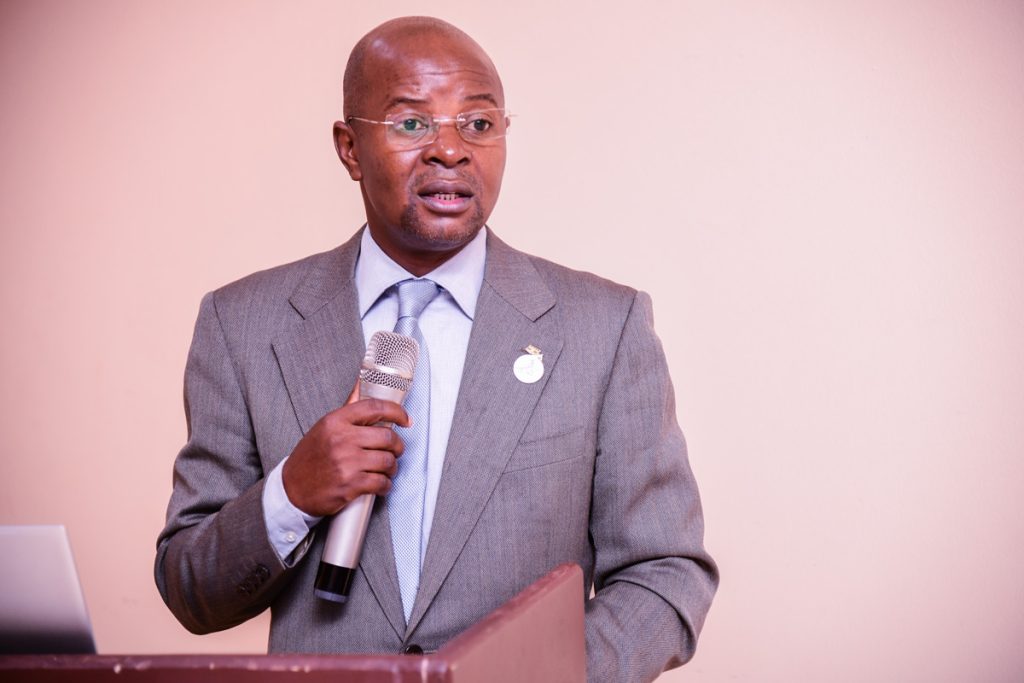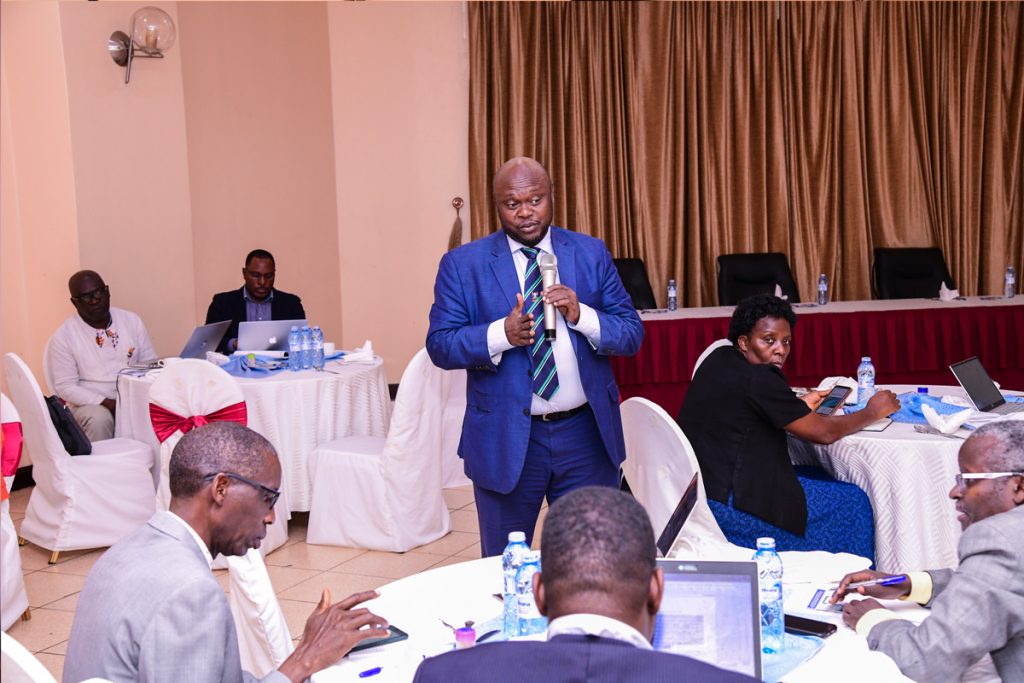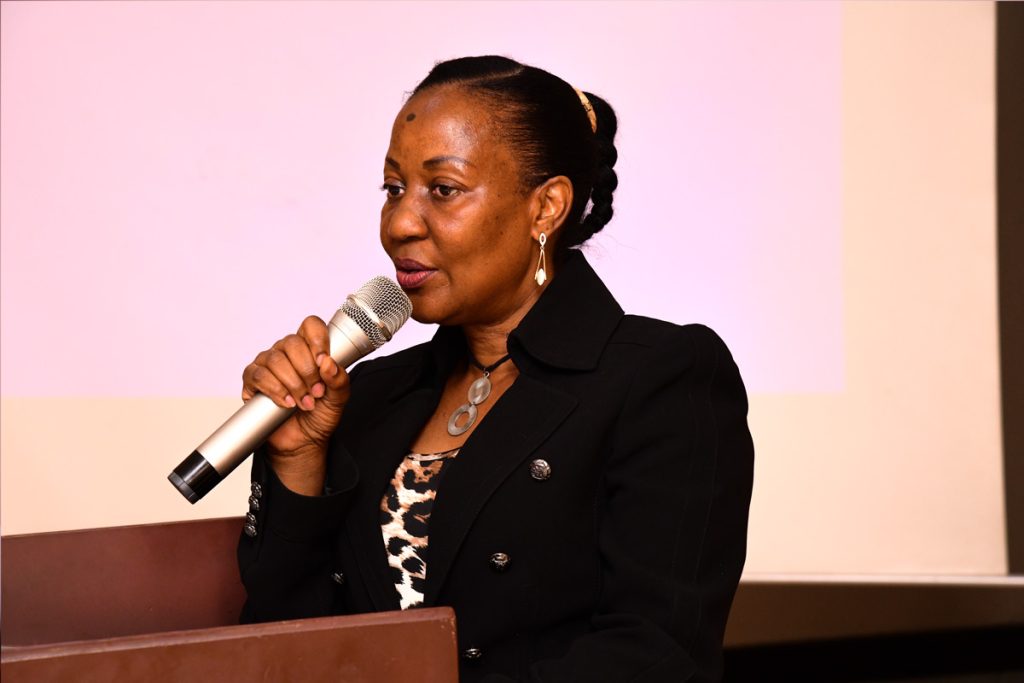Summary:
- The Makerere University Strategic Plan aims to transform into a research-led institution, prompting the Directorate of Research and Graduate Training (DRGT) to align its functions, led by Prof. Edward Bbaale; during a meeting, Prof. Bbaale emphasized the commitment to enhance reporting and documentation of research and graduate training, harmonize reporting structures, and promote digitization; stakeholders praised DRGT’s strategies and offered suggestions for prioritizing graduate training, tracking student progress, enhancing supervision, organizing orientations, and refining reporting templates to capture various components of research and outreach.
The Makerere University Strategic plan stipulates the institution’s goal to transform into a research led University. This pronouncement calls upon university leaders and staff at the different levels to prioritise research and graduate training. It also presents the Directorate of Research and Graduate Training (DRGT) with a golden opportunity to re-align its functions for improved service delivery.
According to the Director Prof. Edward Bbaale, the commitment by DRGT to conform to the University’s strategic direction has led to systematic reviews of its processes, tools and activities.

“We have revised the Graduate Students’ Manual and the Postdoctoral policy. We are also reviewing the Makerere University research agenda,” said Prof. Bbaale during a breakfast meeting held on Tuesday 5 th December 2023 at Imperial Royale Hotel. The meeting was attended by Members of the University Management, College Principals, Deputy Principals, Principal Communication Officers, staff from Mak Public Relations Office, Directorate for ICT Support (DICTS), Makerere University Business School, and DRGT.
Let Us Build Your Online Success!
We are the experts in creating visually stunning and functional websites. With reliable hosting and exceptional customer support, we bring your vision to life. Join hundreds of happy clients who trust us!
Get Started Now📞 Call/WhatsApp: +256 207 800 192
During the meeting, Prof. Bbaale informed the participants that DRGT is committed to bringing all stakeholders on board to ensure that an environment that is conducive for research to thrive is created.
“We would like to work with you to enhance the reporting and documentation of research and graduate training. DRGT re-affirms its readiness to undertake the coordination role. We are here to discuss and understand the reporting structure of DRGT so that together, we contribute to the harmonization of research and graduate training processes/systems,” he said.
Prof. Bbaale highlighted that graduate training is a major component of a research driven university. He pointed out that DRGT would work with Management, staff and other stakeholders to prioritise graduate training; establish research entities to ensure uptake of research; promote, package and market research and innovations; and harness internationalization and partnerships to support research.

He revealed that the harmonization of the reporting structure for research and graduate training was aimed at enabling the timely tracking of progress in research and outputs as well as sharing with the government, funding agencies, research partners and stakeholders in general, the impact of Makerere University’s research in the transformation of communities.
Representing the Vice Chancellor, Prof. Barnabas Nawangwe, the Principal of the College of Agricultural and Environmental Sciences (CAES), Prof. Gorettie Nabanoga commended DRGT for convening key stakeholders at the University to discuss a common reporting structure.
Emphasizing the impact of research, the Vice Chancellor underscored DRGT’s coordination role in working with internal and external partners to come up with innovative ways to market and disseminate research to the communities. “Research from Makerere University should impact communities and contribute to societal transformation,” stated the Vice Chancellor.

In the same vein, Prof. Nabanoga expressed the readiness of the College of Agricultural and Environmental Sciences as an intensive research unit, to work with DRGT to promote research and graduate training. “Without the coordination role of the Directorate of Research and Graduate Training, research will not have impact,” she said.
Digitizing research activities:
Prof. Bbaale emphasized the need for digitization and online presence of research, innovations and graduate training milestones. He mentioned that DRGT embarked on digitizing some of its activities, and equally called upon the Directorate for ICT Support (DICTS) to consolidate digitization efforts.
Highlights of the Research Information Management System:
The Director of DICTS, Mr. Samuel Mugabi highlighted that Makerere University’s Research Information Management System (RIMS) is an online platform that would feed into other systems. “This digital platform focuses on system integration and providing a solution to the reporting challenges.” He subsequently invited Mr. Juma Katongole, the Principal Systems Administrator at DICTS to make a presentation showcasing the major features of RIMS to the audience.

Plenary discussion:
In line with the programme, the Deputy Director (Administration and Graduate Training) and meeting Moderator, Associate Prof. Julius Kikooma, invited the participants to provide input into the reporting structure for research, graduate training processes and the template for DRGT Annual Report.
From the deliberations, participants applauded DRGT on the planned and deliberate strategies targeted at improving the documentation and reporting of research processes, outputs and innovations as well as graduate training. They particularly credited the Directorate for re-organizing of the Graduate Students’ Handbook, which is an important tool of reference for both staff and graduate students.

The participants implored the Directorate of Research and Graduate Training to consider the following:
- Prioritizing graduate training and its support systems/mechanisms: The University leadership and the respective Colleges should come up with strategies to strengthen graduate training.
- Tracking the time graduate students spend on the programme: It is important to monitor the time when each graduate student enrolls and when he/she completes the programme. This will provide key insights on the rates as well as the factors that affect completion on a case by case basis.
- Graduate students’ supervision: Rallying University leaders at different levels to make students supervision attractive through motivation mechanisms, incentives, including the consideration of the number of graduate students, a member of staff is supervising significantly contributing to promotion criteria and/or academic growth.
- Orientation of PhD Students: There is need for DRGT to work with Colleges to organize scheduled orientations for PhD students because they enroll at different times within the academic year. However, the Directorate should continue undertaking the orientation for the Masters students at the centre because they enroll at the same time.
- Reporting on Publications: This should be categorized as follows: Staff publications, Staff and Students publications, and Student publications.
- The Research Reporting Template should provide the following: preliminary information, executive summary, graduate training component and the research component.
- The Research component will highlight research outputs (publications, books, book chapters, patents, policy briefs), Conference papers, posters and presentations, Innovations and Other scientific discoveries, research grants, collaborations and partnerships, as well as Impact and Outreach.
- Impact and Outreach component will highlight community engagement activities such as; public lectures and talks, exhibitions, media coverage, policy influence, dissemination days among others.
- The need for the reporting processes to capture graduate students who are on mobility programmes and their progress.

